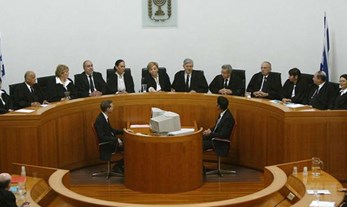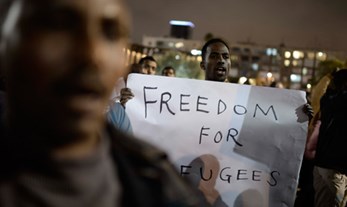


Mass Transport on Shabbat and the Conflict between Religion and State
Written By: Prof. Yedidia Z. Stern
IDI Vice President of Research Prof. Yedidia Stern sets the controversy over mass transportation on Shabbat and holidays in Israel in a broader context, and distinguished between the need for an Israeli-Jewish Shabbat (Sabbath) rather than a religious Shabbat.

Justice vs. Law: King Solomon and Ivan the Terrible
Written By: Prof. Yedidia Z. Stern
The death of John Demjanjuk of natural causes at a ripe old age left many Israelis feeling that an opportunity for justice was missed. Did the Israeli legal system fail when it acquitted Demjanjuk of crimes against humanity? IDI Vice President Prof. Yedidia Stern distinguishes between justice and law, and expresses pride that the Israeli Supreme Court ruled as it did.

The Primary System in Israel: A Balance Sheet
Written By: Prof. Ofer Kenig
The frequent criticism of the Israeli primary system by politicians, the media, and academics often creates the impression that the system should be retired and replaced by a new one. In the article below, which was written prior to the Kadima primaries in March 2012, IDI Researcher Dr. Ofer Kenig surveys the arguments against primaries, analyzes the validity of the criticisms, and explores ways of addressing the weak points of the system.

State Involvement in Equitable Distribution: A Comparison of the Jewish and Arab Sectors in Israel
Written By: Amit Lazarus
An article on the role of the State in the redistribution of economic resources during the first decade of the 21st century, which was written as part of IDI’s Arab-Jewish Relations project.

A Preemptive Strike on Iran: Who has the Authority to Decide?
Written By: Eyal Tsur, Prof. Mordechai Kremnitzer
As the world considers the threat of a nuclear Iran, Israeli public discourse has focused primarily on whether or not Israel should launch a preemptive strike on Iran's nuclear facilities. But who has the authority to decide whether a military operation should be conducted? In this article, IDI Vice President Prof. Mordechai Kremnitzer and researcher Eyal Tsur explore the strengths and weaknesses of the current division of responsibility regarding this matter, and recommend ways of improving the system.

Menachem Begin on Democracy and Constitutional Values
Written By: Prof. Mordechai Kremnitzer, Dr. Amir Fuchs
Although some in Israel hold nationalism and liberalism to be mutually exclusive, former Israeli Prime Minister Menachem Begin was both a proud nationalist and an unwavering guardian of liberal principles. As the Jewish world commemorates the 20th anniversary of Begin's death, IDI is pleased to present "Menachem Begin on Democracy and Constitutional Values," a booklet by IDI Vice President Prof. Mordechai Kremnitzer and Attorney Amir Fuchs, which was originally published in Hebrew on the eve of Yom Kippur, 2011.

The Facts, and Nothing But the Facts
Written By: Dr. Arye Carmon
In an article in The Jerusalem Post, IDI Former President and Founder Dr. Arye Carmon discusses the desired role for commissions of inquiry in Israel.

If They Give, They Will Receive
Written By: Yair Sheleg
In this response to the Supreme Court ruling on the Tal Law, IDI Senior Researcher Yair Sheleg asserts that the exemption of ultra-Orthodox men from military service is an unparalleled <em>Hillul Hashem</em>—a desecration of the Name of God, and shares his views of a possible solution.

The Tal Law: Judicial Activism at its Height
Written By: Prof. Yedidia Z. Stern
The Supreme Court's decision to strike down the Tal Law, after 30 years of avoiding the issue of the exemption of ultra-Orthodox Jews from military service, is an expression of judicial activism that illustrates the transformation that the Israeli Supreme Court has undergone in the last generation. In this op-ed, originally published in Hebrew in <em>Makor Rishon</em>, IDI Vice President Prof. Yedidia Stern asserts that the Court went too far in this ruling and that its activism is hard to justify.

Measuring Israeli Democracy (2011): Epistemological, Methodological, and Ethical Dilemmas
Written By: Prof. Tamar Hermann
This paper, which was prepared for presentation at a conference of the WZB Social Science Research Center in Berlin by IDI Senior Fellow Prof. Tamar Hermann, shares the dilemmas faced by the Guttman Center research team in preparing the annual Israeli Democracy Index in general and in preparing 2011 Israeli Democracy Index in particular.

Is Administrative Detention the Right Tool for Fighting Terrorism?
Written By: Elad Gil
On February 21, 2012, just before the High Court of Justice was to hear his petition, Palestinian detainee Khader Adnan agreed to end his life threatening hunger strike after Israeli authorities agreed to release him in April, at the end of four months of administrative detention. Attorney Elad Gil explores basic questions about the use of administrative detention in Israel and highlights lessons learned from the Adnan affair.

Make the Ultra-Orthodox Serve
Written By: Yair Sheleg
IDI Vice President of Research Prof. Yedidia Stern sets the controversy over mass transportation on Shabbat and holidays in Israel in a broader context, and distinguished between the need for an Israeli-Jewish Shabbat (Sabbath) rather than a religious Shabbat.

In the Aftermath of the Tal Law
Written By: Prof. Yedidia Z. Stern
Will the Israeli Supreme Court's ruling that the Tal Law is unconstitutional really guarantee that the burden of Israel's defense will be shared equally by the country's citizens? IDI's Prof. Yedidia Stern warns that this ruling may actually hinder the integration of the Haredi community into Israeli society rather than promoting it.

Yair Lapid in a Splinter Party Arena
Written By: Dr. Arye Carmon
Israeli journalist Yair Lapid's announced intention to enter politics sparked both excitement and speculation as to whether he planned to start his own party or to join one of the existing parties. While IDI Former President and Founder Dr. Arye Carmon applauds the entrance of talented, committed people into politics, he stresses the need for them to join one of the large, existing parties in order to stabilize the political system.

IDI Responds to the Bar Association Bill
On January 3, 2012, IDI published an advertisement on the front page of Haaretz calling on Prime Minister Netanyahu to reconsider the "Bar Association Bill."

Finding Middle Ground
Written By: Haim Zicherman
In an op-ed in Israel Hayom, IDI researcher Adv. Haim Zicherman argues that a temporary extension of the Tal Law would help the growing trend of ultra-Orthodox enlistment in the IDF and would enable volunteering for civilian service to continue.

The Dinner Guest: Reflections on the Lessons of the Holocaust
Written By: Dr. Arye Carmon
On Friday, January 27, 2012, IDI Former President and Founder Dr. Arye Carmon delivered the keynote address at a ceremony convened by the Massuah Institute in commemoration of International Holocaust Remembrance Day. Addressing the entire diplomatic corps assigned to Israel, Dr. Carmon shared memories of an encounter with a Holocaust survivor that had a profound impact on his life, and contributed to his development of a curriculum entitled “Teaching the Holocaust – An Education towards Values."

Belief in God is Not the Problem in Israel
Written By: Yair Sheleg
Recently, the findings of the third Guttman-AVI CHAI report—A Portrait of Israeli Jews: Beliefs, Observance, and Values of Israeli Jews—were presented to the public. The findings have drawn much media coverage because they revealed that an overwhelming majority of Israeli Jews believe in God. In an op-ed from <em>Haaretz</em>, IDI Senior researcher Yair Sheleg responds to columnists who were alarmed by the findings regarding belief in God, and argues that what is really of concern is the inverse relationship between this belief and belief in democratic values.

The State Comptroller: Auditing the Auditor
Written By: Dr. Arye Carmon
As State Comptroller Micha Lindenstrauss approaches the end of his term, IDI Former President and Founder Dr. Arye Carmon takes issue with him for overstepping the bounds of his authority and for his excessive media presence, in an op-ed originally published in Hebrew in Yedioth Ahronoth on January 31, 2012. In particular, Dr. Carmon singles out Lindenstrauss's statements that the Comptroller's office is the "fourth branch of government" and that "everything is auditable."

Fixing our Broken System
Written By: Dr. Arye Carmon
The Israeli public is increasingly demanding a more effective system of government. In this op-ed from Israel Hayom (February 2, 2012), IDI Former President and Founder Dr. Arye Carmon asserts that reforming the system of government is the only answer to stabilizing the executive so that a party that has been voted into power can actually govern, and points to two types of necessary change: structural and perceptual.

The Exclusion of Women from the Public Sphere
Written By: Yair Sheleg
Israeli society has seen a recent push to exclude women from the public sphere. In this blog entry, translated from the Hebrew, IDI Senior Researcher Yair Sheleg, argues against the recent turn toward extremism, calling on Israelis from all camps to respond to these developments responsibly.

Father Judaism and Mother Democracy
Written By: Yair Sheleg
In an op-ed from Haaretz, IDI research fellow Yair Sheleg responds to settler leader Benny Katzover’s positions on the Jewish and democratic nature of the State of Israel, and argues that Israel should not prefer either of these two identities and should view its Jewish and democratic nature as two manifestations of human dignity.

Restraining Orders Should Alarm Settlers
Written By: Adv. Lina Saba-Habesch, Prof. Mordechai Kremnitzer
In an op-ed originally published in The Jerusalem Post on January 11, 2012, IDI Vice President Prof. Mordechai Kremnitzer and Attorney Lina Saba discuss the administrative restraining orders recently issued against 12 Jewish activists involved in "price tag" activity in Judea and Samaria. What is the legal basis for using these measures and what are the implications of their use?

The New Amendment to the ‘Prevention of Infiltration’ Act: Defining Asylum-Seekers as Criminals
Written By: Prof. Reuven (Ruvi) Ziegler
On January 10, 2012 an amendment to the Prevention of Infiltration Act passed its second and third reading in the Knesset. In passing this act, the government—and the Knesset—chose to walk down a path that is incompatible with the protection of human freedom that is embedded in Israeli constitutional law and that is incompatible with Israel’s obligations under international refugee conventions. Below is a condensed version of an article on this matter that was written by Adv. Reuven (Ruvi) Ziegler for the IDI Hebrew website.

Faking Feminism
Written By: Debora Lederman-Danieli
The issue of the exclusion of women and their marginalization in Israeli society has dominated the media in Israel during the past few weeks. In this article, which was originally published in The Seventh Eye on December 25, 2011, Dr. Debora Lederman-Danieli argues that the media's struggle against the phenomenon of the degradation of women requires much more than disingenuous, populist outcries.

The Exclusion of Women and Control of the Public Sphere
Written By: Prof. Yedidia Z. Stern
Why is the marginalization of women in Israeli society and their exclusion from the public sphere on the rise in Israeli society? In this op-ed, IDI Vice President of Research Prof. Yedidia Stern focuses on the religious Zionist community and the power struggle to determine who will control the public sphere and the space of the religious community.

With Fear, With Prejudice
Written By: Uzi Benziman
The press is traditionally known as the guardian of democracy. In this article from The Seventh Eye Journal, however, Editor Uzi Benziman surveys trends in the Israeli media and asserts that Israeli journalism in 2012 is an ideological, agenda-driven journalism that is rife with intentional bias.

Neeman's "Jewish Poker" Game
Written By: Dr. Amir Fuchs, Prof. Mordechai Kremnitzer
Prof. Mordechai Kremnitzer and Attorney Amir Fuchs explain why they see the "Bar Association Bill" as undermining the rule of law. This bill would change the way that the Bar Association's representatives to the Judicial Appointments Committee are selected, and would apply retroactively.

MK Shlomo Molla on Social Rights and Racism
Written By: Shlomo Molla
In honor of International Human Rights Day, IDI interviewed Kadima MK Shlomo Molla, who has been involved in drafting the Basic Law: Social Rights and heads the Knesset Lobby for the Struggle Against Racism and the Knesset Caucus for Civil Equality and Pluralism.

Dr. Hannah Kehat on the Status of Women in Israel
Written By: Hannah Kehat
In honor of International Democracy Day, the IDI Hebrew website interviewed Dr. Hannah Kehat, founder of the Religious Women's Forum Kolech, on the status of women in Israel today.

